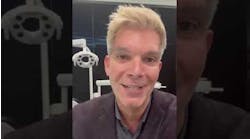QUESTION: I would like to address the oversaturation of the RDH field, which has been since 2007 in the New England area at least. I find the government and Bureau of Labor and Statistics are just given copy, and they post it. They really don't care or know the reality of finding work for RDHs. Also, there are too many RDH schools opening and too many new graduates. Many older RDHs are not retiring, and there is A LOT of backstabbing for a position. This makes it even harder to obtain a position with set hours and any increases in pay, however small.
Many RDHs look every day for work, but for every one position posted, dentists receive hundreds of resumes. Many new grads can't find work to pay back loans, so they often start training in another field. I wish the ADHA and the RDH schools were more concerned for us as a whole. There are too many of us in the field and not enough work. The schools don't even cut back on class sizes by looking at statistics from those who graduated from their programs. I realize this is a real hardship for many fields, but our field has been hit very hard, and I do not see recovery for those in the field, or those with a passion to become RDHs. Passion, sadly, does not pay the bills.
“I wish the ADHA and RDH schools were more concerned for us as a whole. There are too many of us in the field and not enough work.” I ask if you are a member of the ADHA, and if so, are you an active member? The ADHA is its members, and if there are issues to be addressed, this can be accomplished by contacting your District Trustee. Regarding too many of us in the profession and not enough work, I assume you’re discussing traditional dental hygiene employment in the dental office. I would encourage you to look at other types of positions, such as those in education, research, the corporate arena, and public health. Our profession is in need of dental hygiene educators.
The ADHA is aware of the changing professional landscape of the profession as dental hygiene evolves. To address these concerns, in 2013 the ADHA hosted the second annual career workshop, “Dental Hygiene in a Changing World: Empowering, Supporting, & Developing Your Career” to help dental hygienists take charge of their professional futures. “Dental Hygiene in a Changing World” provided tools in the areas of corporate, public health, research, educator, administrator, and entrepreneur. The entire workshop is available on demand at adha.org/dental-hygiene-changing-world.
Dental hygiene is changing. With more dental hygienists and fewer dentists expected in the coming years, we’re seeing different types of dental hygiene practitioners, clinical settings, and workforce models. There are currently 37 states that permit dental hygienists to initiate patient care in a setting outside of the private dental office without the presence of a dentist. There are many states with alternative oral health workforce models. These include: Advanced Dental Therapist in Minnesota and Maine; Advanced Dental Hygiene Practitioner in Connecticut and Massachusetts; Licensed Dental Practitioner in Vermont; and others.
So while it may be frustrating to be unable to obtain “traditional” dental hygiene employment, I encourage anyone is this position to think a bit outside the dental hygiene box and look at expanding opportunities beyond clinical private practice. Think about a career shift to non-traditional careers, such as public health, research, or corporate positions. Develop tangible ways to approach potential career opportunities, focusing on the skills needed when entering a different workforce, such as interviewing, resume development, soft skills, how to make yourself marketable, and professional networking. I wish you the best of luck.
ANSWER FROM KRISTINE HODSDON, RDH, kristineahodsdon.com:
I am from N.H., so I completely understand the regional comment. I have been laid off, collected unemployment, and have felt anxious, worried, fearful, and downright scared about my financial sustainability. The economic world changed in 2007-2008. A boatload of professions and industries were hit with decreased jobs and increased saturation of qualified and even overqualified candidates.
I empathize with your frustration and your search for solutions. Not knowing your past strategies or action plans about securing employment, I invite you to consider the following with the intent of supporting your passion for dental hygiene.
1. Get involved with positive action-oriented hygienists. There are plenty of avenues to immerse yourself in – communities that lift you up, not tear down you or other dental hygienists or allow you to stay remain negative and feel as though you’re a victim. Who are the people you collaborate with each day?
2. Set a plan with goals and objectives. What type of position are you seeking? How many hours per week would you like to work, and in what radius of your home? There are many roles for dental hygienists – clinical, education, public health, corporate, entrepreneur. By taking the time to create a strategy, you’re less likely to get distracted with the next shiny object that pops up in your inbox.
3. Write out what qualities and skills you have to share.
4. Ask, do I need to invest in myself? Take a career assessment, hire a coach, attend targeted and trusted programs, and read topic-specific books. Facebook advice may even be helpful, yet perhaps you are worth more.
5. Work your plan.
6. Mindset shift – Dental hygiene is not just about getting a “job.” It is a career. Create opportunities based on your skills that serve people in your community.
7. Do you know your financial budget? How much money you need to bring in on a monthly basis? Are you bringing in enough money to pay the bills, the credit card debts, the mortgage, the car payments? Prioritize, and then...
8. Do you have a plan B or C to get your money handled?
9. Have you asked another professional to review your resume or CV? How are you – really – when interviewing? Honing your skills in your weak areas can bring awareness to how others see you during the interview process.
10. Have confidence in yourself. Having an empowered mindset will resonate with all your potential employers and collaborators. People can sense desperation, and often times those “unspoken feelings” are what separates two equally qualified candidates.
As an executive coach (see website above), my passion is to support my clients with tools and strategies, and to hold them as powerful as I know they are, especially when they do not believe it themselves. Also, I cannot make them show up and do the work they need to do to reach the goal they want to reach. Believe in yourself and reach out for support. Feel free to reach out to me at [email protected].
PAST THURSDAY TROUBLESHOOTERS:
How can dental office manager get participation at staff meetings?
The dental practice's website is completely out of date. Help!
How can overwhelmed office manager talk dentist into getting her help?
Send your questions for the experts to answer. Responses will come from various consultants associated with Speaking Consulting Network, Academy of Dental Management Consultants, or Dental Consultant Connection. Their members will take turns fielding your questions on DentistryIQ, because they are very familiar with addressing the tough issues. Hey, it's their job.
Send your questions to [email protected]. All inquiries will be answered anonymously every Thursday here on DIQ.







